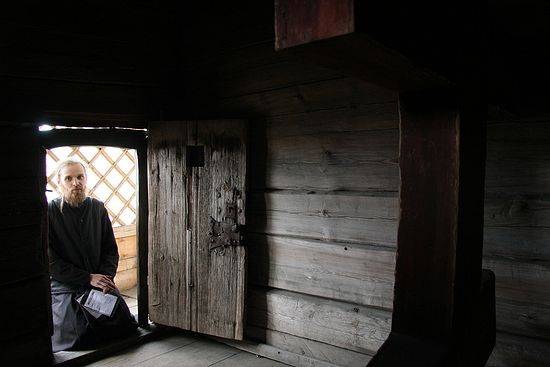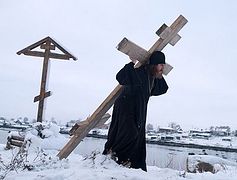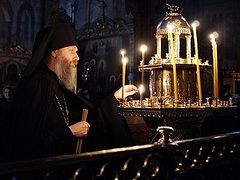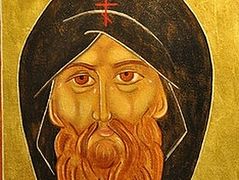The spiritual life is a sojourn, that is not just a metaphor. In the Church we have opportunities to experience the spiritual life as a sojourn. A sojourn requires time and movement – we move from one place to another over time. Things around us change, and we change in this process as well. This is what makes repentance and forgiveness possible. We are journeying to the Kingdom of God, to the eschaton, to heaven, to God’s Paradise.
Great Lent is a journey to Pascha – to the celebration of the Resurrection. But it is movement not to the past, but forward to the eschaton. The past – the events of the crucifixion and Resurrection of Jesus Christ – are part of this sojourn, but only because they are eternal events. We are not trying to get back to the empty tomb of Christ, for there the women who discovered it did not know what sense to make of it, even when the angel explained it, and the disciples didn’t believe the women. [We sing “Christ IS risen…” not “Christ was risen…”] Going back to that time and moment cannot help us. It is only in light of Pentecost – God’s sending His Holy Spirit upon the Church and the world – that we make sense of the empty tomb and resurrection of Christ.
Tradition is not a backwards looking frame of reference – it is always geared to move ahead to the eschaton. We are not going to find Christ in the past. The entire New Testament is geared toward the Risen Lord, toward His Kingdom, His glory, His triumph.
“Blessed is the kingdom.…” That is how we start the Divine Liturgy and Matins – it is declaring the blessedness of that Kingdom which is to come, which is breaking into this world, and yet not fully realized here. We start our services by declaring the blessedness of our destination.
In the Epistle, St. Paul speakings about “knowing the time”. He is not talking about clock time, but rather a much broader sense of era the world is in. The fulfillment of Christ in His Kingdom is arriving. We need to use the time to prepare ourselves, to be ready for its arrival. Great Lent is that season in which we prepare for the coming of Christ in His Kingdom.
Romans 13:11-14:4
And do this, knowing the time, that now it is high time to awake out of sleep; for now our salvation is nearer than when we first believed. The night is far spent, the day is at hand. Therefore let us cast off the works of darkness, and let us put on the armor of light.
We are to use this time, this season of Great Lent to for our sojourn. Walk properly. Sojourn correctly – in an Orthodox manner! St Paul sets up some pairing that we are to reject:
revelry and drunkenness,
lewdness and lust,
strife and envy.
We put on Christ is baptism – how are we to live clothed in Christ?
Lent is to help learn the proper moderation in living. Drunkenness is not OK. Pornography is not OK. Anger and Antagonism are not OK. If these things are present in our life, we need to repent! As St. Paul exhorts: “Now the works of the flesh are plain: fornication, impurity, licentiousness, idolatry, sorcery, enmity, strife, jealousy, anger, selfishness, dissension, party spirit, envy, drunkenness, carousing, and the like. I warn you, as I warned you before, that those who do such things shall not inherit the kingdom of God” (Galatians 5:19-21). The sins for which we need to repent are not all found in the Ten Commandments.
We are to practice a sobriety in Lent – but not just for the duration of the 40 days of Lent. We are practicing in Lent in order to live this lifestyle always. It is not OK to get drunk on Pascha night!
We are not aiming to get through Lent so that we can return to drunkenness and revelry, lewdness and lust, strife and envy come Pascha.
Let us walk properly, as in the day, not in revelry and drunkenness, not in lewdness and lust, not in strife and envy. But put on the Lord Jesus Christ, and make no provision for the flesh, to fulfill its lusts. Receive one who is weak in the faith, but not to disputes over doubtful things. For one believes he may eat all things, but he who is weak eats only vegetables. Let not him who eats despise him who does not eat, and let not him who does not eat judge him who eats; for God has received him. Who are you to judge another’s servant? To his own master he stands or falls. Indeed, he will be made to stand, for God is able to make him stand.
Lenten fasting is not the time to pay attention to what others are eating or not eating. We are not to criticize anyone based upon what they eat. That is no basis for any evaluation of anybody.
Lenten foods are a return to the foods God provided in the delightful luxuries of Paradise. We claim we want to reach this Paradise. Our Lenten journey is taking us there. So, what did they eat in Paradise?
And God said, “Behold, I have given you every plant yielding seed which is upon the face of all the earth, and every tree with seed in its fruit; you shall have them for food. (Genesis 1:29)
And the LORD God commanded the man, saying, “You may freely eat of every tree of the garden…” (Genesis 2:16)
Fruits, greens, vegetables are the foods of Paradise.
So what do we love more? – God’s Paradise and its leaves and fruits and nuts or this fallen world and its steaks, lamb, ham and salmon? Do we really long for the Kingdom of God or are we hoping Lent we pass by quickly so that we can return to things of this world which we love so much?
Are we willing to trade the things of this world which we love and lust after for the things of Paradise? If so, we need to show it in our lives and to live for paradise rather than for this world.
Lent is a testing. It is sifting us to see which of us loves God more than the things of this world. It turns out we love the things of this world – the food, the sex, the entertainment, our money, wealth, shopping, drinking, prosperity and our possessions. We want to sit with the rich man not dream about crumbs like Lazarus (Luke 16:19-31), not matter what the consequences of eating from the rich man’s table might be.
Pascha night is not mostly about ham, lamb and fine cheeses.
It is about the Kingdom of God, and the fact that this world is passing away. Are we headed toward that Kingdom, or are we in pursuit of receding worldliness? Do we live for this world or for the Kingdom? Are we willing to abandon the good things of earth which is passing away for life in Paradise?
Gospel: Matthew 6:14-21
For if you forgive men their trespasses, your heavenly Father will also forgive you. But if you do not forgive men their trespasses, neither will your Father forgive your trespasses. Moreover, when you fast, do not be like the hypocrites, with a sad countenance. For they disfigure their faces that they may appear to men to be fasting. Assuredly, I say to you, they have their reward. But you, when you fast, anoint your head and wash your face, so that you do not appear to men to be fasting, but to your Father who is in the secret place; and your Father who sees in secret will reward you openly. Do not lay up for yourselves treasures on earth, where moth and rust destroy and where thieves break in and steal; but lay up for yourselves treasures in heaven, where neither moth nor rust destroys and where thieves do not break in and steal. For where your treasure is, there your heart will be also.
The spirit of the fast is not found in what we eat or don’t eat. But where our treasure is.





